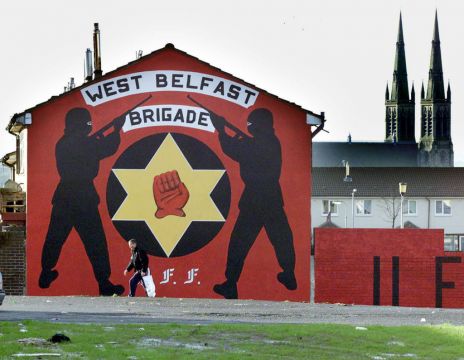Senior Irish and British politicians lamented the undisciplined nature of loyalist groups compared to the IRA, weeks after the terrorist group declared a ceasefire in August 1994.
At the same time, officials warned that the IRA were not necessarily “supermen” when it came to maintaining a ceasefire.
At a meeting of the Anglo-Irish Conference in September 1994, senior ministers and officials from the Irish and British governments met to discuss how they could build on the ceasefire and finally deliver peace for Northern Ireland.
Both sides agreed that a loyalist ceasefire would be welcomed.
Patrick Mayhew, who would become the longest serving Secretary of State for Northern Ireland, expressed disappointment that loyalist groups were “very volatile”.
“While the IRA are a tightly disciplined organization, this lot are all over the place – a more unruly horse,” he told the meeting, according to an Irish Government write-up of the session.
Most of the meeting was dominated by discussions of the ceasefire and if the IRA commitment to peace was genuine.
Mr Mayhew began by telling the meeting: “We think that a very important task has been to banish the idea, prevalent in some Unionist circles, that there is only one conceivable explanation for the IRA’s sudden abandonment of what they had been fighting for – namely, that they had been granted clandestinely what they had wanted all along.”
“We have lifted the broadcasting ban, thank heavens – this was a nonsense for a long time.”
Tánaiste Dick Spring said that the ceasefire offered a “glorious opportunity”.
“Adams – whatever view we may take of him – seems to be able to bring his people with him. There is strong US pressure on him to deliver peace. That is why he got his visa in the first place.”
“If you want them (Sinn Féin/IRA) to say ‘permanent’, they are not going to do so. But from everything they have said, both in public and in private conversations, what they are saying is that it is over.
While all sides hoped loyalist groups would follow suit with a ceasefire, the two sides showed differing perspectives on the stance of the IRA.
Northern Irish civil service chief David Fell told the meeting: “The sooner we can find a way for Sinn Féin spokesmen to say things which are helpful to the British Government, the better.”
“All they have to say is that the Irish Government say that it is all over for good, and they are right. This may be pedantic, but neither Adams nor McGuinness has so far said this… If they said that you had interpreted their intention correctly, we would be further down the road now.”
Mr Mayhew tells the meeting: “Best of all would be if they were to say something directly and not obliquely. The Prime Minister feels very strongly that it should be direct…. The longer it goes on without a direct statement, the more people’s scepticism is enhanced.”
“The British Government recognizes that they cannot say that it is ‘permanent’. But we have not required them to use that word.”
Sean O’hUiginn, a senior Irish official, told the meeting: “We must be careful not to fall into the trap of believing the IRA’s own mythology. They are not Supermen. There is a dividing line for them between honesty and propaganda. The former means that they cannot give a guarantee of permanence.
“There is very little doubt about their intentions. It is for real and it is not a cosmetic game. The leadership has very little place to go other than to continue on the path it has chosen.”
The material can be viewed in the National Archives in file 2021/48/16.







